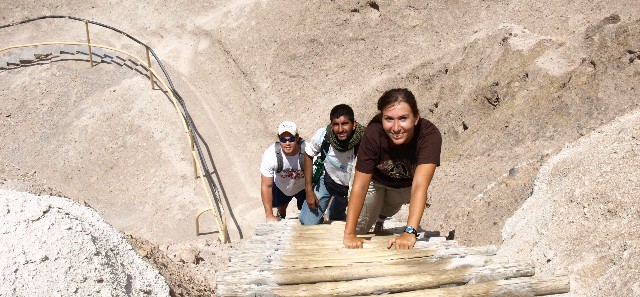
Careers in the Geological Sciences–FAQs
What are the geosciences and what do geoscientists do?
Geoscientists study the Earth, including the environment.
Can I get a job with a bachelor’s degree?
Yes, there are many opportunities for employment at all degree levels.
What sectors provide the most job opportunities for geoscientists?
Employment opportunities are most abundant in environmentally-related industries but are also available in the petroleum and minerals industries as well as government agencies.
Answers to these and other questions can be found here
or contact the Department of Geological Sciences.
Career Connections Center
Potentially Useful Job Boards
Environmental Careers: https://environmentalcareer.com/jobs/
Employ Florida: https://www.employflorida.com/vosnet/Default.aspx
EcoJobs: http://www.ecojobs.com/
Conservation Job Board: https://www.conservationjobboard.com/job-type/conservation-internships
USAJobs: https://www.usajobs.gov/
WayUp: https://www.wayup.com/
Potentially Useful Pages
The Beyond120 Pages list many internship links as well.
https://www.advising.ufl.edu/beyond120/
LinkedIn: https://university.linkedin.com/linkedin-for-students
What Can I Do with this Major? https://whatcanidowiththismajor.com/major/geology/
Resume/Cover Letter CCC Resources
Resume: https://career.ufl.edu/resumes-documents/resumes/
Cover Letter: https://career.ufl.edu/resumes-documents/cover-letters/
Other Useful Connections.
Green-Environmental Career Roadmap
https://career.ufl.edu/wp-content/uploads/2020/05/Green-Environmental-Career-Roadmap.pdf
Environment & Energy Career Roadmap
https://career.ufl.edu/wp-content/uploads/2020/05/Environment-Energy-Career-Roadmap.pdf
GeoClub Facebook Group
https://www.facebook.com/groups/UFGeoClub/
Department of Geological Sciences Courses Without Pre-requisites
- GLY 1000: Exploring the Geological Sciences-addresses a range of topics from earthquakes and volcanoes to groundwater and sinkholes to waves and beaches. (3 credits of P)
- ESC1000: Introduction to the Earth Sciences, topics range from oceans, atmosphere, and climate to rocks, minerals, earthquakes, and volcanoes. (3 credits of P)
- OCE 1001: Introduction to Oceanography, topics range from the origin of the oceans to their role in climate change and the life they support. (3 credits of P)
- GLY 1102: Age of Dinosaurs, an introduction to the origin and evolution of dinosaurs, and the world they lived in. (3 credits of P or B)
- GLY 1150L: Florida Geology Laboratory, an introduction to Florida’s geology using laboratory exercises and field trips. (1 credit of P, + lab credit)
- GLY 2010C: Physical Geology, a lecture-laboratory class focused on the solid earth; topics include shorelines, water resources, earthquakes, and volcanoes. (4 credits of P, + lab credit)
- GLY 2030C: Introduction to Environmental Geology, a lecture-laboratory class focused on interactions of society and the geologic environment (4 credits of P, + lab credit)
- GLY 2100C: Historical Geology, an overview of the history of life on our planet and the environments that influenced their development. (3 credits of P or B, + lab credit)
- GLY 3105C: Evolution of Life in North America, a combined lecture-laboratory course focusing on the history of life and environments in North America (3 credits of P or B)
- GLY 3163: Geology of American National Parks, an introduction to the geology of our most famous national parks and how they reflect the geologic history of the U.S. (3 credits of P)
- GLY 3074: Oceans and Climate, an introduction to the current and historical interactions between the oceans and climate (3 credits of P)
